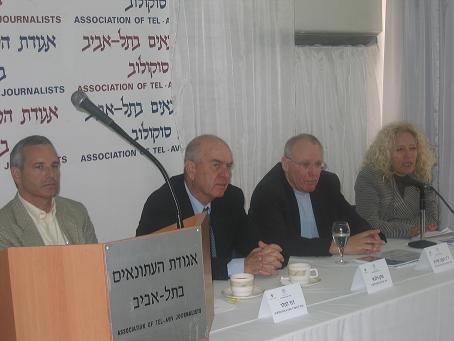Economist Ya'akov Shainin: Government investment in applied R&D is needed so that startup companies will grow here in the future as well * The document was submitted yesterday to the Minister of Science, who also presented its substance at the meeting of the Knesset's Science Committee
From right to left: Prof. Mina Teicher, Chief Scientist of the Ministry of Science, Yaakov Sheinin, Director of the Economic Models Company, Minister Matan Vilnai, Director of the Ministry of Science, David Lefler. Photo: Avi Blizovsky
Israel needs to double and even triple the investment in applied R&D, that is, research and development in universities that have applied aspects, but the level of uncertainty in these studies is still too high for venture capital funds to take an interest in them. This is what Dr. Yaakov Shainin said yesterday at a press conference on the occasion of the publication of a report he prepared on the subject for the Ministry of Science."
According to him, in order to have a "pipeline" of projects that will become start-up companies even in a few years, it is necessary to develop the ideas at a stage that falls halfway between the universities and the chief scientist or the TMT's incubator projects. Says Shainin and adds that this is where the Ministry of Science should enter. "Investments in the area of the seam between academia and industry have a tremendous economic return, because otherwise either the knowledge is lost or the scientists are going to apply it abroad, therefore allocating budgets for applied R&D is not an expense for the government but an investment that yields results."
"Israel has a very high growth potential, inherent in the advanced technology sectors, which is the main growth engine of the economy. Israel is currently in a small group of leading countries in the field. The rare combination that exists in Israel between a high level of technological ability, a high level of academic research, worldwide export relations and a rare ability to raise capital is the one that provides the "fuel for the engines of growth".
In response to the scientist's question whether there is a kind of repetition of the initiative model that drove the entire venture capital industry in Israel, Shainin answered that unlike venture capital funds, the return, if any, from applied R&D comes in longer time frames than the time frame in which the venture capital funds are interested - two or three years. In such a study, there is no chance that private companies will take a risk, and therefore the government is the one that should push it."
Minister Vilnai, who noted that the reference to Sheinin was made before he took office, announced that he would adopt the conclusions of the report and presented his work plan for the coming period, even though his stay in the office may be short: "We are today in a historic moment to put science and higher education in their rightful place Because of the new budget and because of the security relaxation. We need to bring them to the center of public discourse and understand that it is not just something nice to receive Nobel prizes. But in order to increase capital, human capital and growth. Science and education are the main engine of the economy. Israel can be the number 1 power in science and the way to get there is by bringing back Israeli scientists from every corner of the world they are there. Another area is the regional R&D centers as part of bringing science to the community and not keeping it in the ivory tower and greatly strengthening our scientific ties with the European programs. I'm talking about the political level that our relations with the Europeans and the Americans will be institutionalized. For the first time we are driving a project - a Venus satellite, the first time a satellite is driven by the Ministry of Science and not by the Ministry of Defense."
The science committee of the Knesset also discussed the importance of science and technology in Israel at a ceremonial meeting to open the session. As expected, all the speakers shared the statement that the situation is not good and that for many years Israel has lived on the dividends of its investments in the field of defense R&D and higher education.
The chairman of the committee, MK Leah Ness, opened the meeting by stating that although science is the section that can enable the continued economic growth of the State of Israel, it is treated as a marginal factor and is constantly being cut. The Chief Scientist of the Ministry of Science, Dr. Mina Teicher also presented the Ministry's work plan and promised that by the next Rehovot Conference to be held in January, the Ministry will set priorities in the areas in which government research support will be provided.

